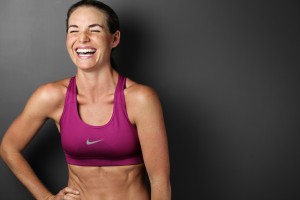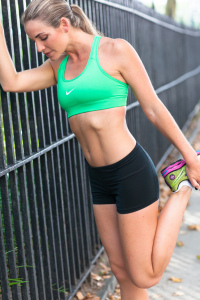 People come in all shapes and sizes. Athletes come in all shapes and sizes. It’s often an odd transition viewing yourself as an athlete, but I ask all my clients to do so. When you slightly change your perspective of yourself, you’ll view your nutrition choices, sleep, training, priorities, and life differently. I find this shift is extremely important for folks who struggle with nutrition/weight and with time-management and sleep. Instead of viewing food as “good” or “bad,” you start to think about your training, and what choices will properly aid you in pre-run fuel, post-run recovery, or general nutrition. Suddenly you won’t feel “bad” about a food choice, because your perspective of you as a human being will be different. The same is true with sleep – you’ll suddenly be aware of how it’s an important component of training – and that if you want to train harder and improve, you’ll need to get more Zzz’s.
People come in all shapes and sizes. Athletes come in all shapes and sizes. It’s often an odd transition viewing yourself as an athlete, but I ask all my clients to do so. When you slightly change your perspective of yourself, you’ll view your nutrition choices, sleep, training, priorities, and life differently. I find this shift is extremely important for folks who struggle with nutrition/weight and with time-management and sleep. Instead of viewing food as “good” or “bad,” you start to think about your training, and what choices will properly aid you in pre-run fuel, post-run recovery, or general nutrition. Suddenly you won’t feel “bad” about a food choice, because your perspective of you as a human being will be different. The same is true with sleep – you’ll suddenly be aware of how it’s an important component of training – and that if you want to train harder and improve, you’ll need to get more Zzz’s.
I remember when I personally went through the shift, and how I finally felt settled and had an “identity” as far as food goes. I’ve been pretty open about my relationship with food and body image in the past, and I know I am not the only person who has struggled with it. But running and training for challenging race goals gave my body a purpose, a hunger for achievement, and I became excited and dedicated to doing what it took to morph my body for those goals. I too referred to myself as “not a real runner” for a long time – dismissing my involvement in this sport because I wasn’t professional, fast, or taking it seriously.
Over the last 5 years, my body has changed a lot. There have been years where I was curvier, years where I was rail-thin and friends voiced concerns, and years where I have been muscular with relatively low body fat. My size has swung from 6-0 and everywhere in between, and changes depending on what I am training for, how hard I am training, and honestly how I am feeling. There are some months where all I want to do is eat, and I need to pull myself up off the couch and into the gym or the park. There are other months where I feel so motivated and energized, I forget to eat and am struggling to take in enough calories. As you can imagine, this changes my body. And though I hate to admit it, it changes how I feel about myself.
What’s interesting is how I am perceived – often by strangers, casting directors, acquaintances, and friends I haven’t seen in a long time. I must always look “athletic,” because the topic usually comes up in conversation. I have had casting directors and the like ask if I am a gymnast, yogi, dancer, Pilates instructor, CrossFit activist – the list goes on. Ironically, few guess “runner.” Perhaps, to be fair, this is because runners come in all shapes and sizes. But to hear “Really? You don’t look like a runner -” it somehow feels like a stab in the gut. I usually am quick defend myself, saying I am not a sprinter (so I am not rocking large powerful muscles and very low body fat), and I am also not an elite middle or long distance runner – folks who are often associated with looking unhealthy, waif-like, and gaunt. Here’s the thing: while I am indeed a runner, I am not a professional athlete. Folks expect to see the stereotype on magazines, winning marathons or track events – not the folks who are “better than average” but also are not training full-time.
I assume if I struggle with being judged, and often have to defend my body and my choices, that other folks out there do too. Unfortunately, females are judged based on how they look before they can even open their mouths. And while I shouldn’t assume this is only a female thing, being female myself, I can only speak for the ladies.
To the folks who judge – I say go watch a race. You will see all body types cross that finish line – 5K through Marathon. You will see the elite runners you expect us all to resemble, you will also see body types doing amazing things that will honestly catch you by surprise. Don’t judge, be inspired. After all, they are the ones training and clocking miles while you sit there on your ass and point a finger.
And while some folks are probably not aware that making assumptions or judgements about a person’s body and sport can be hurtful, we should all remember to think before we speak. It’s the same with fat shaming, or assuming someone’s life is easy because they look like our idea of a “model.” You have no idea how hard someone might work for their sport, or to maintain a healthy weight. You also probably don’t know how hard that person has worked to achieve where they are today.
Being an athlete is hard. It’s a huge time commitment, which makes it a big part of your identity – whether you realize it or not. Wear that identity with pride. Train for your sport and your body will reflect your hard work, and hopefully give you the result you want. There is no perfect body or size. What’s perfect for you is what will help you achieve your goals and feel your best. If I was told gaining 10lbs. would make me faster and set crazy PRs, I’d be the first in line to pack on those additional pounds – assuming it wouldn’t hurt my health, of course. Sadly, that’s not true. Your body is your tool in this world, and we are only given one. What we do with it is our choice.
Recently when given the whole “Really? You’re a runner?!” response, I carefully explain that indeed I am – and that runners come in all shapes and sizes, and their bodies will usually be different depending on the distance and pace one runs. I figure if I cannot stop that awkward comment from arising, perhaps I can educate the person asking and they’ll think twice before assuming something about body types in the future. And for the record, I have never taken one yoga, Pilates, CrossFit or gymnastics classes – so all of those guesses are WRONG. Go figure, right? And while I used to be a dancer, it has been a few years since I have been in class. Again, proof that many snap judgements are totally off-base. I am ever going to look like Shalane Flanagan? Nope. Am I ever going to be as fast as Shalane Flanagan? Nope. And that’s OKAY!!!!!
I hope if you are struggling with your own relationship with food, body image, weight, or role in your sport that you are kind to yourself. Don’t let a stranger’s uneducated opinion sway how you feel. And if you are looking to become lighter and leaner, remember that there is no quick fix – it’s a process. You don’t owe anyone anything. But you do owe it to yourself to be happy in your skin.







